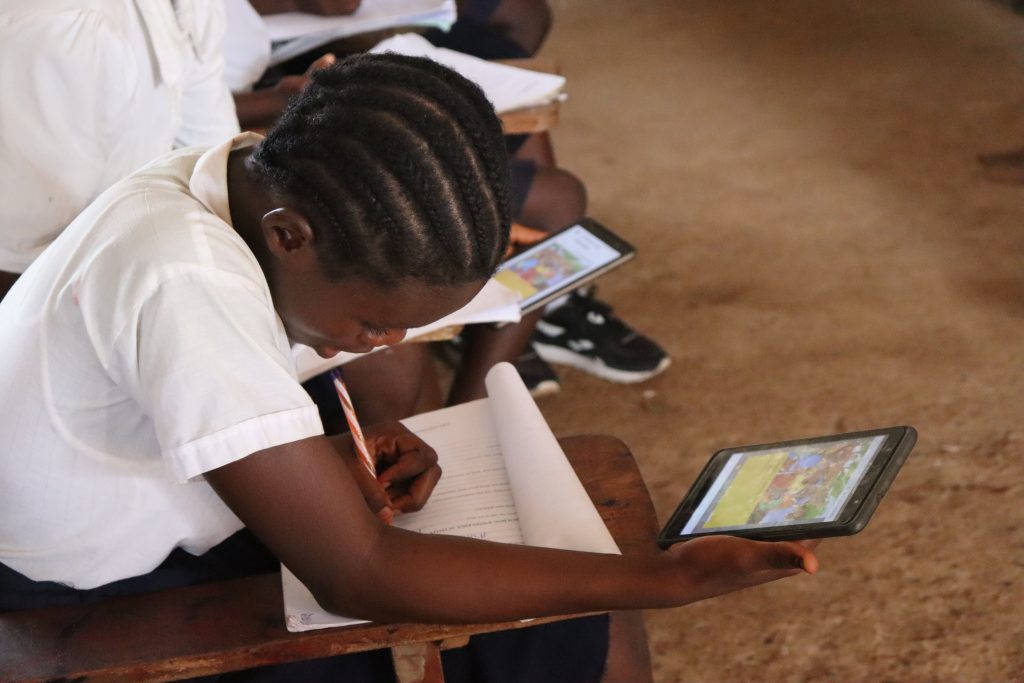Girls’ Accelerated Learning Initiative – expanded (GALI-X)
Partner: CODE
Background
Due in part to the civil war legacy of disrupted school enrolment, the more recent Ebola crisis and the impact of the COVID pandemic school closures, the challenge of over-age girls in early grades is particularly acute in Liberia. Without academic support and encouragement, these girls are at a high risk of dropping out of school and missing the opportunity to become literate, empowered and educated women.
CODE’s assessments conducted in 2016 showed that 66% of children, no matter their grade, were reading at a pre-primary level. The majority of these children were girls. The primary completion rate in Liberia is only 34%, but for poor girls in rural areas it’s a dispiriting 14%.
Project objectives
GALI-X will support adolescent girls (ages 11-15) who are too old for their grade (Grades 1 -3) and at highest risk of dropping out. These girls face overwhelming odds in their pursuit of a quality education. Lack of parental support; low self-worth; poor family literacy; and mounting social pressures push them into teen pregnancy, early marriage and/or the labour market.
The girls live in peri-urban areas of Liberia and attend 40 under-resourced primary schools in the counties of Bomi, Margibi, and Montserrado. Most girls do not live with their parents but rather with extended family members in order to attend school. Unfortunately, living with guardians means these girls are often neglected and given extraordinary amounts of chores to “earn their keep”.
GALI provides over-age girls with afterschool small-group tutoring to accelerate learning and equip them with valuable life-skills so they can quickly and confidently advance to more age-appropriate grades, increasing their chances of staying in school.
In the medium-term we expect to see many participating girls double-promoted each year. In CODE’s last cohort 77% were double-promoted and the remainder promoted one grade-level. Mastering foundational literacy and numeracy, and rapid acceleration to a more age-appropriate grade will help girls complete primary school and advance to junior high school in the longer-term.
This $100,000 will expand GALI’s reach from 20 now involved in the program to 40 schools that have large numbers of over-age girls at high risk of dropping out. This is a holistic program that incorporates:
- Daily small group lessons (5-7 girls) led by a specially trained teacher (most often female)
- Weekly life-skills lessons to build confidence and knowledge (newly incorporating climate action and awareness)
- Access to diverse learning materials, including girl-focused books written and illustrated by Liberians; mobile learning labs; textbooks; and workbooks
- Nutritious meals
- High quality and reusable sanitary pads
- Community service/engagement (e.g. “World Clean Up Day”)
- Mentorship by female teachers who the girls come to see as “aunties”
To prepare for their leadership roles in GALI, teachers participate in professional development workshops to build relevant skills and competencies. Four intensive workshops are offered as part of this program:
- Gender and life-skills
- Instructional strategies
- Accelerated kindergarten
- Mobile learning labs
Additionally, all teachers receive twice-monthly in-class mentoring visits to support skills development.
Given overwhelming local support for digital learning, the number of MLL schools will increase from 11 to 15, as well as the number of tablets per school from 6 to 8. CODE has found that access to MLL helps to strengthen confidence, incentivizes regular attendance, sparks interest in learning, and ultimately helps girls advance more quickly.
GALI has evolved over the years as CODE has listened and learned how to best support the girls’ success. They address barriers such as menstruation, low parental support, and hunger, and have piloted innovations like the MLLs. This next phase – designed through extensive consultations with school leaders, teachers, education officials and participating girls – reflects further enhancements including additional MLLs, a more robust feeding-program, climate education and accelerated kindergarten.
To reduce the number of children entering Grade 1 already over-age, CODE will pilot accelerated kindergarten, aiming to advance boys and girls to Grade 1 within a few months. Kindergarten teachers will be trained and provided with special learning resources to help students reach their learning milestones more quickly. This will be conducted during the normal school day.
The Ministry of Education (MOE) in Liberia plans to incorporate climate education into their curriculum. This project will incorporate this content as follows:
- A climate awareness lesson added to the life-skills curriculum
- Digital resources on climate change added to MLLs
- Books on climate/environmental stewardship distributed
- Participation in community-actions, e.g. “World Clean Up Day” organized by former Monrovia mayor and environmental champion, Mary Broh
Why partner with CODE?
CODE’s mission is to enable student learning by increasing access to qualified educators and locally relevant, high quality learning materials. This has been their focus since 1959. Since 2009, CODE has supported over 500 schools and 125,000 students. GALI’s focus on adolescent girls as well as the use of MLLs has helped to inform CODE’s work in Sierra Leone and Malawi.
This is the third project that 60 million girls has funded with CODE.


